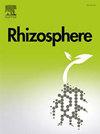Inoculation with a rhizobacteria synthetic community enhances sugarcane stress resilience through targeted modulation of plant-microbe interactions
IF 3.5
3区 生物学
Q1 PLANT SCIENCES
引用次数: 0
Abstract
Sustainable agriculture demands innovative strategies to enhance crop productivity through plant–microbe interactions. Synthetic communities (SynCom) offer a targeted approach for this purpose. This study investigated the molecular mechanisms underlying sugarcane responses and the dynamics of its rhizosphere microbial community following inoculation with a SynCom called MetG2 at the gene expression level. A greenhouse inoculation experiment was conducted, followed by shotgun metagenome and metatranscriptome sequencing. Multi-omics analysis revealed significant temporal shifts in the microbial community, with an up-regulation of genes related to flagellar assembly, chemotaxis, quorum sensing, and biofilm formation, particularly within Proteobacteria, indicating active microbial movement toward root surfaces. Additionally, genes associated with nutrient acquisition, hormone synthesis, siderophore production, and volatile organic compound (VOC) synthesis were enriched, suggesting stimulated beneficial microbial activities. Sugarcane plants also exhibited dynamic responses, including the up-regulation of hormone-related genes (auxin, cytokinin, salicylic acid) and nutrient transporter genes (nitrate, phosphate, potassium, sulfur). Stress resistance genes such as trehalose 6-phosphate phosphatase, phenylalanine ammonia-lyase, expansin, and antioxidant-related genes were also induced. These findings highlight the complex molecular interplay between sugarcane and microbes after MetG2 inoculation, supporting its potential as a sustainable strategy to enhance crop productivity and resilience.
接种根杆菌合成群落通过有针对性地调节植物与微生物的相互作用增强甘蔗的抗逆性
可持续农业需要创新战略,通过植物与微生物的相互作用来提高作物生产力。合成社区(SynCom)为此提供了一种有针对性的方法。本研究在基因表达水平上研究了接种MetG2后甘蔗根际微生物群落的动态变化及其响应的分子机制。进行温室接种试验,随后进行散弹枪宏基因组和亚转录组测序。多组学分析揭示了微生物群落的显著时间变化,与鞭毛组装、趋化性、群体感应和生物膜形成相关的基因上调,特别是在变形杆菌中,表明微生物积极向根表面移动。此外,与养分获取、激素合成、铁载体产生和挥发性有机化合物(VOC)合成相关的基因也被富集,表明有益微生物的活动受到刺激。甘蔗植株也表现出动态响应,包括激素相关基因(生长素、细胞分裂素、水杨酸)和营养转运基因(硝酸盐、磷酸盐、钾、硫)的上调。胁迫抗性基因如海藻糖6-磷酸磷酸酶、苯丙氨酸解氨酶、膨胀蛋白和抗氧化相关基因也被诱导。这些发现强调了接种MetG2后甘蔗与微生物之间复杂的分子相互作用,支持其作为提高作物生产力和抗灾能力的可持续策略的潜力。
本文章由计算机程序翻译,如有差异,请以英文原文为准。
求助全文
约1分钟内获得全文
求助全文
来源期刊

Rhizosphere
Agricultural and Biological Sciences-Agronomy and Crop Science
CiteScore
5.70
自引率
8.10%
发文量
155
审稿时长
29 days
期刊介绍:
Rhizosphere aims to advance the frontier of our understanding of plant-soil interactions. Rhizosphere is a multidisciplinary journal that publishes research on the interactions between plant roots, soil organisms, nutrients, and water. Except carbon fixation by photosynthesis, plants obtain all other elements primarily from soil through roots.
We are beginning to understand how communications at the rhizosphere, with soil organisms and other plant species, affect root exudates and nutrient uptake. This rapidly evolving subject utilizes molecular biology and genomic tools, food web or community structure manipulations, high performance liquid chromatography, isotopic analysis, diverse spectroscopic analytics, tomography and other microscopy, complex statistical and modeling tools.
 求助内容:
求助内容: 应助结果提醒方式:
应助结果提醒方式:


